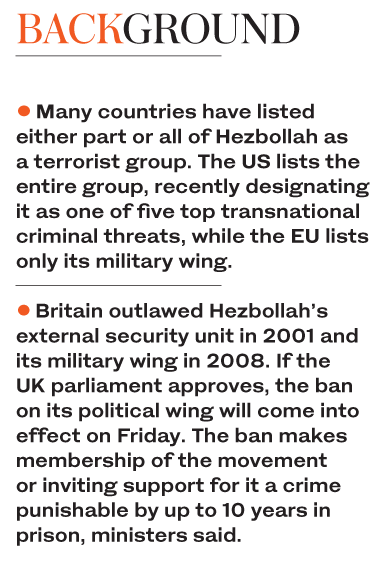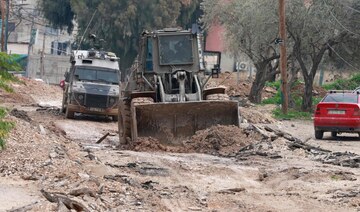DUBAI: A UK ban on Hezbollah, outlawing the entire Lebanon-based group as a terrorist organization, can’t come soon enough for regional political analysts.
“It is better late than never,” said Dr. Abdulkhaleq Abdulla, a former chairman of the Arab Council for the Social Sciences, who is based in the UAE. “It’s about time that a country like the UK recognized that Hezbollah is nothing but an extension of Iran, the number one country financing terrorism in the region.
“This has taken a long time, but it is great that Britain is now leading Europe. Hopefully, other European countries will follow suit.”
The UK outlawed Hezbollah’s military wing in 2008, but the ban now will extend to its political arm. Authorities said they are no longer able to distinguish between the group’s military and political wings.
Under the changes, supporting Hezbollah will be an offense carrying a sentence of up to 10 years in prison.
The decision follows outrage over the display of the Hezbollah flag, which features a Kalashnikov assault rifle, at pro-Palestinian rallies in London.
“The UK had this problem in trying to distinguish between the military wing of Hezbollah and the political wing of Hezbollah,” Abdulla said. “But everybody has recognized that one feeds into the other, and the military wing is the other face of the political wing.”
Hezbollah’s military and political arms were “two faces of the same coin.”
The group deserved its classification as a terrorist organization, as many Arab and Gulf states had already recognized. “It is going to badly dent its reputation. It wanted to project itself as a national liberation movement, but now we have a major power saying it is nothing but a terrorist organization.”
Abdulla said the decision sent a signal to Iran as well since many countries were “getting ready” to face up to Tehran’s activities in the region. “Much of this activity is done through Hezbollah. Iran will be affected one way or the other.”
The group is now a major political party in Lebanon, where it holds three Cabinet posts.
“Hezbollah is continuing its attempts to destabilize the fragile situation in the Middle East,” UK Home Secretary Sajid Javid said. “We are no longer able to distinguish between their banned military wing and the political party. Because of this, I have taken the decision to proscribe the group in its entirety.”
According to Dr. Albadr Al-Shateri, politics professor at the National Defense College in Abu Dhabi, the classification of Hezbollah as a terrorist organization will squeeze the party financially and limit its sympathizers’ activities in the UK.
“The long-term challenge is how to decommission Hezbollah as a militia and turn (it into) a political party. That can only happen if Israel is persuaded to relinquish the Lebanese-occupied territories in exchange for the decommissioning of Hezbollah.”
Hezbollah was established in 1982 during the Lebanese civil war and has been a Shiite militant movement since.
 “This is inevitable in many ways for a country like Lebanon, it’s the elephant in the room,” said Alex Vatanka, senior fellow at the Middle East Institute in Washington.
“This is inevitable in many ways for a country like Lebanon, it’s the elephant in the room,” said Alex Vatanka, senior fellow at the Middle East Institute in Washington.
“The British decision encourages (moves) to unify the Lebanese body of politics and to put the issue of Hezbollah to the test for the Lebanese people. No one knows if it will be possible — probably not — but there are two states within one and that is not always going to be beneficial to the Lebanese people because it creates contradictions and puts a group’s agenda above the agenda of Lebanon as a country.”
The decision from London would keep that argument alive and fuel debate, Vatanka said.
“I don’t expect Hassan Nasrallah (Hezbollah’s leader) will make something different tomorrow. It’s the rest of Lebanese politics we can expect to react to this ... because Hezbollah has formidable power in Lebanon.”
Whether the decision amounts to anything more than a symbolic gesture, Vatanka believes only time will tell. “There has been a trend of governments within governments or competing governments. Iran was the first example followed by Lebanon, but it’s a trend we might see elsewhere with militias in Syria and Iraq, and it’s not a good trend for representation in Middle Eastern countries.”
He said Middle Eastern societies should have the discussion in their own countries first, but suggested foreign powers such as the UK could shape the debate by taking a stance. “This position has much to do with the nature of Hezbollah’s activities as well,” he said. “It’s about the militant nature of Hezbollah.”
Dr Majid Rafizadeh, an Iranian-American political scientist, president of the International American Council and a board member of the Harvard International Review, said the decision was a significant blow to the Islamic Republic. “Hezbollah has been a fundamental pillar of the Islamic Revolutionary Guard Corps (IRGC) and its elite branch the Quds Force which operates in foreign nations,” he explained. “Hezbollah has been instrumental in expanding the IRGC's stranglehold in other countries beside Lebanon, including in Syria. This development also highlights the increasing gap between the EU and Iran.”
He said enlisting Hezbollah as a terrorist organization was long overdue. “Set up by the IRGC, since its inception, Hezbollah's modus operandi has been anchored in employing terror activities to advance the Iranian regime's interests,” he noted. “Other European countries ought to join the UK as well. More importantly, enlisting Hezbollah as a terrorist organization is not sufficient; as long as Iran, Hezbollah's paymaster, enjoys global legitimacy and trade with the EU, Tehran will continue to fund and arm Hezbollah. In order for the UK to succeed at countering Hezbollah's terror activities, the flow of funds to Iran should be cut off, and any financial dealings and military cooperation between Iran and Hezbollah must be monitored closely and sanctioned.”
The militant group has a long-standing association with crime and terror activities. In 1994, it carried out a suicide truck bombing of a Jewish community centre in Buenos Aires, killing 85 people and wounding 300. Eighteen years later, it struck again, blowing up a bus carrying Israeli tourists at the airport in Burgas, Bulgaria, killing seven and wounding 32.
In 2006, the group captured two Israeli soldiers, sparking a 34-day war in which 1,200 people were killed. In 2009, Hezbollah came under attack again from the international community with claims of worldwide terrorism and political assassinations in Lebanon.
The group has also denied accusations concerning its activities in Syria in early 2011, claiming it had no “military role in Arab countries.”
In February 2016, the US Drug Enforcement Administration (DEA) implicated Hezbollah in a drug- trafficking and money-laundering network that spanned four continents. According to a DEA report, the group had links with South American drug cartels in a cocaine-smuggling operation in Europe and the US.
The proceeds funded a money- laundering scheme known as the Black Market Peso Exchange and provided Hezbollah with “a revenue and weapons stream.”






























